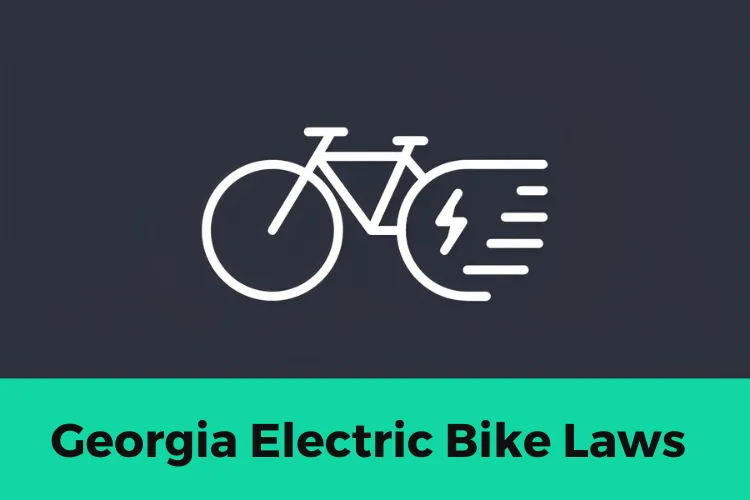Electric bicycles are growing in popularity across Georgia for commuting, recreating, and running errands. However, the Georgia Electric Bike Laws can be complex and confusing. This article provides an overview of key regulations, restrictions, and usage guidelines for riding electric bikes legally in Georgia. We’ll summarize the three classes, speed limits, required equipment, access rules, and safety best practices you should know before hitting the streets and trails on an e-bike.
Definition of an Electric Bike in Georgia
In Georgia, an electric bicycle or e-bike is legally defined as, A bicycle or tricycle equipped with fully operable pedals, a saddle or seat for the rider, and an electric motor of less than 750 watts that meets one of the following requirements:
(A) The motor provides assistance only when the rider is pedaling and ceases to provide assistance when the bicycle reaches the speed of 20 miles per hour(Class 1/2); or
(B) The motor engages only when the rider is pedaling and ceases to provide assistance when the bicycle reaches the speed of 28 miles per hour(Class 3).”
Key components of this definition:
- Has fully functional pedals
- Has an electric motor under 750W
- Motor stops assisting at 20mph or 28mph depending on class
E-bikes meeting this definition are regulated as standard bicycles under Georgia law and do not require registration or licensing as motor vehicles. The definition provides legal clarity on what type of e-bikes are permitted for use on roads, trails, and bike paths in the state.
Georgia Electric Bike Laws: Everything You Need to Know

Are electric bikes street legal in Georgia?
Yes, electric bicycles are street legal and permitted on public roads in Georgia, provided they fall under the state’s legal definition of an e-bike and obey all standard traffic laws. The state considers legal e-bikes to be regular bicycles, so they do not require registration or licensing. Class 1 and 2 e-bikes with motor assist up to 20mph are allowed on most public streets, while faster Class 3 e-bikes may face some local restrictions. Riders must follow all the same traffic, signaling, and riding rules as non-motorized bikes. E-bikes are not permitted on limited access highways where bikes are prohibited.
What are the different classes of electric bikes in Georgia?
Georgia recognizes three main classes of e-bikes based on their speed capabilities and motor assistance:
- Class 1 e-bikes provide electric assistance only while the rider is pedaling, and the motor cuts out once the bike reaches 20mph. These are the most common electric bikes seen in Georgia.
- Class 2 e-bikes also have a maximum assisted speed of 20mph, but they have a throttle mode that can engage the electric motor without pedaling. This allows the rider to get the bike moving from a stop on motor power alone.
- Class 3 e-bikes, often called “speed pedelecs,” also only engage the electric motor while pedaling, but they can reach higher assisted speeds of up to 28mph. Class 3 e-bikes are less common in Georgia than Class 1 and 2.
What are the speed and power limits for electric bikes in Georgia?
The state of Georgia limits the power output of e-bike motors to 750 watts (1 horsepower). This allows enough electric assist for flat areas and hills, while preventing the bikes from reaching dangerously high speeds.
In terms of speed, Class 1 and 2 e-bikes in Georgia are capped at a maximum assisted speed of 20mph. This allows the bikes to keep pace with urban traffic while preventing excess speeds. Class 3 e-bikes can assist up to 28mph, but may face local restrictions.
Are there any age restrictions to riding an electric bike in Georgia?
For Class 1 and 2 e-bikes, Georgia doesn’t impose age limits statewide but local ordinances may – Class 3 e-bikes that assist up to 28mph require riders to be at least 15 years old under state law.
Are electric bikes allowed on sidewalks in Georgia?
The state of Georgia does not prohibit e-bike usage on sidewalks, but local city and county ordinances may impose restrictions. Riders should check their local municipal codes to see if any sidewalk riding bans are in place before using an e-bike on sidewalks. Usage may be limited to certain areas or banned entirely within the city or town limits.
Are electric bikes allowed on bike paths in Georgia?
Yes, Class 1 and 2 e-bikes are generally permitted on bike paths in Georgia unless specifically prohibited by a local ordinance. Class 3 e-bikes are typically prohibited from bike paths unless adjacent to a roadway. Riders should verify regulations in their area.
Are electric bikes allowed on trails in Georgia?
Many trails in Georgia allow e-bike access, but some limitations may be in place. Riders should check with both state and local authorities to understand any e-bike prohibitions on specific trails. Natural surface trails and hiking paths may be more likely to restrict e-bikes, while paved multi-use trails are often permissible. Usage regulations can vary from trail to trail.
Do I need a license to ride an electric bike in Georgia?
No license is required to operate an e-bike in Georgia, as they are classified under state law as regular bicycles rather than motor vehicles. The same rules apply to riding a standard non-motorized bike. Riders do not need to register, pass a test, or hold a license to use an e-bike legally in Georgia.
Do I need insurance to ride an electric bike in Georgia?
Georgia state law does not require e-bike riders to hold insurance policies on their bikes. However, given their motors and higher speeds, it may be wise to consider additional coverage options. Riders should check if their homeowner’s or renter’s insurance covers e-bike accidents or consider getting a separate policy for liability protection.
Do I need to register my electric bike in Georgia?
Georgia does not require registration or licensing of e-bikes used on public streets and trails. The bikes are treated as ordinary bicycles under the law. However, some local jurisdictions may require registration, so check area ordinances to be sure. State registration is not necessary.
Do I need to wear a helmet when riding an electric bike in Georgia?
Helmet use is not required by Georgia law for adults riding Class 1 and 2 e-bikes but is recommended for safety – however, all operators must wear helmets when riding Class 3 e-bikes per state law.
Can I ride an electric bike on the road in Georgia?
Yes, you can ride Class 1 and 2 e-bikes on public roads in Georgia unless specifically prohibited. They are considered regular bicycles under the traffic laws. However, Class 3 e-bikes may be restricted on some roads due to higher speeds. As with standard bikes, e-bikes should follow all traffic signs, signals, and lane markings.
Can I ride an electric bike on the highway in Georgia?
No, e-bikes are prohibited on interstate highways and limited access roads in Georgia where bicycles cannot safely travel at high speeds. E-bikes traveling under 20mph should not be ridden on roads with speed limits above 35mph. Faster Class 3 e-bikes may face additional road restrictions in some areas due to safety concerns.
Can I ride an electric bike at night in Georgia?
Yes, you may ride e-bikes at night, but the bike must be properly equipped with front and rear lighting. White front lights and red rear reflectors are required by Georgia law, as well as pedal reflectors. Using additional flashing lights can further increase visibility and safety when riding after dark.
Can I ride an electric bike with a passenger in Georgia?
The state of Georgia does not prohibit carrying passengers on e-bikes. However, some local ordinances may regulate the number of people allowed on a bike. Checking your local laws is advised, as some municipalities may prohibit passengers or add additional requirements like the use of a special seat.
Can I transport cargo on an electric bike in Georgia?
E-bike cargo carriers are permitted in Georgia, allowing riders to transport packages and other goods. Trailers hitched behind e-bikes are also allowed. Local load limits may restrict cargo based on combined rider and package weight, so check area ordinances.
Can I ride an electric bike in state parks in Georgia?
E-bikes are generally allowed on roads and multi-use paths in Georgia’s state parks, but not on hiking trails. Riders should check the regulations at each specific park, as some limitations on trail access may exist. Special permits may be required for e-bikes in certain wilderness areas or reserves.
Can I ride an electric bike on city streets in Georgia?
Yes, e-bikes can be ridden on city streets in Georgia subject to the same traffic laws as regular bikes. However, local municipal codes may prohibit e-bikes on certain roads or sidewalks within city limits, so check area regulations. Class 3 e-bikes may face restrictions on some streets.
Also Read:- Florida Electric Bike Laws: Everything You Need to Know
Disclaimer
This article provides general information about electric bicycle laws in Georgia but does not constitute legal advice. Laws and ordinances can vary between jurisdictions. For specifics on e-bike usage and regulations in your area, please check with local authorities or consult an attorney who is licensed to practice law in Georgia. Riders should verify their compliance with all applicable statutes and rules before operating an e-bike within the state.

1 thought on “Georgia Electric Bike Laws: Everything You Need to Know”